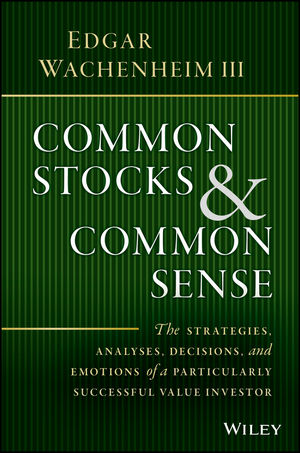Time Arbitrage is the term given to the process of seeking to profit from buying a security where the current market price does not reflect the expected value. The mispricing may result from a short term issue facing the company which is not expected to impact the long term intrinsic value of the company or the market misjudging the future economic performance of the company which will see its shares re-rated. In time, the share price is expected to converge with its value, hence the term 'Time Arbitrage'.
“Value investing is a large-scale arbitrage between security prices and underlying business value.” Seth Klarman
The increasing short term focus of market participants often means investors place too much weight on short term factors impacting the company to the exclusion of the company's longer term potential. This can provide a structural edge. Many clients demand short term results and have little patience for short term underperformance, and this means fund managers risk losing both assets under management and their job if they don't focus on the next month, quarter, or maybe year at most. In addition, the increasing flow of money into passive and quant strategies and ETF's either chasing historical performance and/or on the basis of index composition can result in egregious mispricings of stocks.
“Time-arbitrage just means exploiting the fact that most investors - institutional, mutual funds or hedge funds - tend to have very short-term horizons, have rapid turnover or are trying to exploit very short term anomalies. So the market looks extremely efficient in the short run. In an environment with massive short-term data overload and with people concerned about minute-to-minute performance, the inefficiencies are likely to be looking out beyond, say, 12 months." Bill Miller
“The longer you can extend your time horizon the less competitive the game becomes, because most of the world is engaged over a very short time frame.” William Browne
"We are disinterested in short term results and thus have the luxury of focusing our research and purchases on the much less competitive universe of stocks that have less promise of near-term appreciation, but that have exciting longer term potential. This gives us a competitive edge." Ed Wachenheim
Focusing on the long term can also provide a ‘Behavioural Edge.' When a high quality stock is sold down due an earnings miss, a product issue, a management change, an industry or regulatory issue, a geopolitical event or some transitional business issue there's a decent chance investors have over-reacted to the negative news due to psychological biases. Peter Bevelin points out in his excellent book 'Seeking Wisdom - From Darwin to Munger' that "it is a natural tendency to act on impulse - to use emotion before reason. The behaviours that were critical for survival and reproduction in our evolutionary history still apply today." The combination of fear, social proof [other investors are selling], loss aversion [we feel losses twice as much as gains] and recency bias [we overweigh what has happened recently and underweigh or ignore the long term evidence] counteract the average investors attempt to make a rational decision.
"When we find companies we consider undervalued, it's typically due to short-term worries we believe are temporary." Francois Rochon
“We’re very focussed on paying a cheap price, and that only comes about when there’s some short term challenge.” David Herro
"Our thesis often is based on the passage of time. What makes a negative story negative may just be that the next three to six months - the time space in which Wall Street analysts live - don't look so great." Robert Kleinschmidt
Effective 'Time Arbitrage’ requires an investor to ensure the problem facing the company is temporary and likely to be resolved. Asking questions such as 'does the company remains structurally sound?', 'has there been any structural change in the competitive landscape?' 'is the balance sheet still strong?' will help identify whether the share price dislocation is likely to be temporary or entirely warranted due to permanent issues. When answering these questions the investor must be open-minded, intellectually honest and test the investment thesis to avoid the behavioural biases that can blind an investor to negative information.
"We rely on concentrated research to identify great businesses that are trading at highly discounted valuations because investors have over-reacted to negative macro or company specific events. That's the time-arbitrage part of the strategy, taking advantage when the market reacts to short-term factors that have little impact on long-term intrinsic values" Bill Ackman
Most investors spend their time thinking about the short term as it's much easier than contemplating the future. Investors also fall into the trap of extrapolating the recent past into the future. This provides the opportunity to profit by focusing on how a company might be performing in a few years' time and developing an alternate thesis that most investors have overlooked. Positive developments can include a consolidating industry, a new product to be launched, a major cost reduction program, the end to a major capital expenditure program, reversal of a bad inventory decision, positive management changes, a technological change which will drive sales, or corporate activity.
"Common situations that result in a mismatch between share price and share value .. may simply be time arbitrage, where we think the business performance looking out 18 to 24 months will be much better than the share price implies." Robert Alpert
"In my opinion, most individuals, including securities analysts, feel more comfortable projecting current fundamentals into the future than projecting changes what will occur in the future. Current fundamentals are based on known information. Future fundamentals are based on unknowns. Predicting the future from unknowns requires the efforts of thinking, assigning probabilities, and sticking one's neck out - all efforts that human beings too often prefer to avoid." Ed Wachenheim
To be successful the investor must have an insight into the future that is different to the consensus otherwise the positive news will already be reflected in the company's share price.
"In order to earn outsized returns, we need to hold opinions about the future that are different and more accurate than those of the majority of other investors. In fact, it can be said that successful investing is all about predicting the future more accurately than the majority of other investors." Ed Wachenheim
“One of the few sure ways to make money is to have a view that is off-consensus and have that view turn out to be right. To be contrarian is not enough. You have to be right. Contrarian is a plus. To be contrarian and be right on you judgement is when you get the golden ring. It doesn’t happen that much but when it does happen you make extraordinary amounts of money.” Michael Steinhardt
"I'm often asking "What's the next guy's thesis?" Why is he going to buy it from us 18 months from now when the stock is up 50%? It's not just going to be that it's worth 50% more. It's important to imagine the narrative that will make the next investor think it's a good investment then." Ricky Sandler
"All of the consensus is already baked into the price. In order to be correct in the markets, in order to make money in the markets, you have to see something that the consensus doesn't see. So you have to have an independent point of view." Ray Dalio
“The number one principle would be do not look at the world today, what’s happened in the past and happening currently, is in the price. Try and think how the world may look differently in 18-24 months from now and try and base your investments on that and not what’s true today. It’s amazing what that single little exercise can do.” Stanley Druckenmiller
While the time frame and price outcomes associated with 'Time Arbitrage' are more uncertain than most 'risk arbitrage' investments, the returns can be significant. Many of the Investment Masters happily acknowledge that their edge is from taking a longer term time frame. Like any investment activity, success requires hard work and independent analysis.
"Time Horizon Arbitrage .... If there is a free lunch on Wall Street, we feel it is the time horizon perspective." Christopher Begg
“The single greatest edge an investor can have is a long-term orientation.” Seth Klarman
"I would say our edge is the willingness to take a longer view of a business." Glenn Greenberg
“You have to extend your time horizon if you want any chance of doing well. The competition in the space really thins out. You have an opportunity to arbitrage time over others.” William Browne
Further Reading -
The recent book 'Common Stocks & Common Sense' by Ed Wachenheim of Greenhaven gives an inside view into implementing 'time arbitrage' through case studies of 11 investments made since the fund was founded in 1987. Greenhaven invests 'with a two to four year time horizon and cares little about the near term outlook for its holdings'. Over the past 25 years, accounts managed by Greenhaven have achieved average annual returns of very close to 19 percent. Highly recommended reading.



